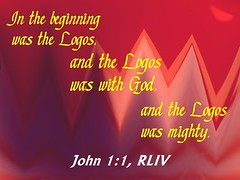Luke 1:35 - The angel answered her, "The Holy Spirit will come on you, and the power of the Most High will overshadow you. Therefore also the holy one which is born from you will be called the Son of God. -- World EnglishThis scripture is sometimes presented by trinitarians as a proof-text that is alleged to speak of the trinity. The angel is identified as the "angel of Jehovah"* in Luke 1:11 and as Gabriel in Luke 1:19. Gabriel in verse 35 is speaking to Mary.
--------
*In the Old Testament, we never find the expression "angel of the Lord", but it is actually, "angel of Jehovah (or, as some prefer, angel of Yahweh). It should be obvious that in the extant NT manuscripts that in this expression the Holy Name has been changed to a form of the Greek word for "Lord". See also my studies related to "Angel of Jehovah"
Most often, trinitarians simply cite the verse, without comment, and evidently, based on their presumption that the trinity is the default reasoning, imagine that the scripture is speaking of their trinity. According to Walter Martin, the trinity appears in Luke 1:35. (Kingdom of the Cults, 2003 edition, page 83) One claims that one of the things Gabriel accomplished was "to assure Mary that God is Triune"; however, since no idea at all is presented in Luke 1:35 that "God is triune", that idea has to be thought beyond what is stated, and then affixed to, and read into, what is actually stated.
Evidently what the trinitarian is imagining and assuming in this verse is that "the Most High" ("the Highest" in some translations) is not the triune God, but rather is referring to only one person of the triune God, and similarly respecting the "Holy Spirit" and "the Son of God". The "Most High" is definitely speaking of only one person, and that one person is identified in Luke 1:32 as being Jehovah God of Isaiah 9:7. Luke 1:32 thus differentiates Jehovah God from the Son to whom Jehovah gives the throne of David. Jesus is never referred to anywhere in the Bible as being the "Most High".
Additionally, in Luke 1:35 itself, we find that the word "God" -- in the expression, "Son of God" -- is referring to only one person, not three persons. Jehovah God is not in Luke 1:35 or anywhere else in the Bible revealed to be more than one person. Despite what trinitarians may conceive and read into the scriptures, we have no scriptural reason to think that the word "God" in Luke 1:6, Luke 1:8, Luke 1:16, Luke 1:19, Luke 1:26, Luke 1:30, Luke 1:32, Luke 1:37, Luke 1:47, Luke 1:64, Luke 1:68, Luke 1:78 is speaking of more than one person as "God'; all these verses are speaking of the same one person as being "God", and no where in Luke 1 or anywhere else in the Bible is the only Most High ever presented as being more than one person. Jesus himself identified the "the only true God" as being Jehovah, the one whom he referred to as his father. -- Isaiah 61:1; John 17:1,3.
While God surely made use of his holy spirit in the conception of Mary, and thus Mary gave birth to His Son, this does not mean that we need read the triune God dogma into what is stated.
